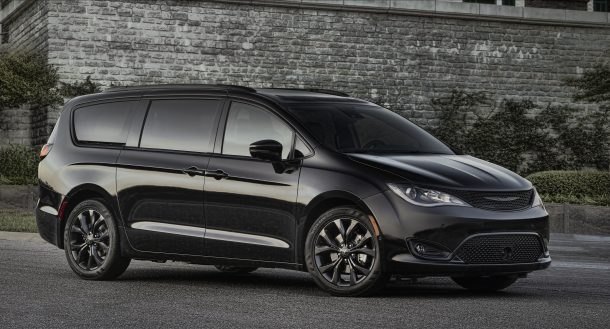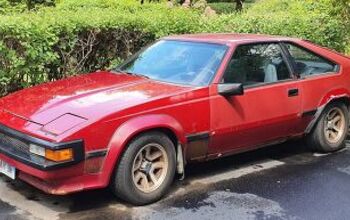Chrysler's Pacifica Ads Grow Mildly Risque, As All Minivan Ads Should

Of all the automakers embroiled in the Mad Men-era rush to plumb the psyches of American car buyers, Chrysler’s Dodge division stood head and shoulders above the rest in one key marketing element: sex. It sells, apparently, and Chrysler Corp. made sure to instill a little bit of it, overtly or subconsciously, into its print and TV advertising. As the circa ’66-67 “Dodge Rebellion” campaign gave way to 1968-70’s “Dodge Fever” gambit, the impact of the counterculture movement and America’s rapidly liberalizing attitudes soon became apparent in Dodge’s ad copy.
It was this era in Chrysler’s marketing history that spawned what’s arguably the most sexist (and psychosexual) car ad ever printed: Dodge’s 1969 Charger R/T ad, titled “The Eternal Triangle.”
These were sexy times for America, but even sexier times for Dodge, which had clearly grown too hot under the collar. The onset of the 1970s saw the brand put the tie-dyed shirt and address book in storage, trading its hedonistic copy for the far tamer “Dodge Material” campaign, and the rest is history (some of it quite embarrassing). Given this rich marketing heritage, it’s nice to see Chrysler attempt to spice up a family-oriented minivan with sex.
Two ads came out this week for the Chrysler Pacifica, one featuring comedic actress Kathryn Hahn (who’s now an FCA ad veteran), the other a continuation of the brand’s “Street Smarts” campaign.
It’s odd that both of these ads, released Wednesday, get a little suggestive in their content. As it’s 2018, we’ve grown used to car ads that feature, essentially, ourselves, our life goals, and our ideologies. Oh, and family, family, family. New car marketing, when it’s not pretentious, confusing, or maudlin, is usually eye-rolling or annoying in some other way. When an audience stands a chance of having fun, we notice.

More by Steph Willems
Latest Car Reviews
Read moreLatest Product Reviews
Read moreRecent Comments
- W Conrad I'm not afraid of them, but they aren't needed for everyone or everywhere. Long haul and highway driving sure, but in the city, nope.
- Jalop1991 In a manner similar to PHEV being the correct answer, I declare RPVs to be the correct answer here.We're doing it with certain aircraft; why not with cars on the ground, using hardware and tools like Telsa's "FSD" or GM's "SuperCruise" as the base?Take the local Uber driver out of the car, and put him in a professional centralized environment from where he drives me around. The system and the individual car can have awareness as well as gates, but he's responsible for the driving.Put the tech into my car, and let me buy it as needed. I need someone else to drive me home; hit the button and voila, I've hired a driver for the moment. I don't want to drive 11 hours to my vacation spot; hire the remote pilot for that. When I get there, I have my car and he's still at his normal location, piloting cars for other people.The system would allow for driver rest period, like what's required for truckers, so I might end up with multiple people driving me to the coast. I don't care. And they don't have to be physically with me, therefore they can be way cheaper.Charge taxi-type per-mile rates. For long drives, offer per-trip rates. Offer subscriptions, including miles/hours. Whatever.(And for grins, dress the remote pilots all as Johnnie.)Start this out with big rigs. Take the trucker away from the long haul driving, and let him be there for emergencies and the short haul parts of the trip.And in a manner similar to PHEVs being discredited, I fully expect to be razzed for this brilliant idea (not unlike how Alan Kay wasn't recognized until many many years later for his Dynabook vision).
- B-BodyBuick84 Not afraid of AV's as I highly doubt they will ever be %100 viable for our roads. Stop-and-go downtown city or rush hour highway traffic? I can see that, but otherwise there's simply too many variables. Bad weather conditions, faded road lines or markings, reflective surfaces with glare, etc. There's also the issue of cultural norms. About a decade ago there was actually an online test called 'The Morality Machine' one could do online where you were in control of an AV and choose what action to take when a crash was inevitable. I think something like 2.5 million people across the world participated? For example, do you hit and most likely kill the elderly couple strolling across the crosswalk or crash the vehicle into a cement barrier and almost certainly cause the death of the vehicle occupants? What if it's a parent and child? In N. America 98% of people choose to hit the elderly couple and save themselves while in Asia, the exact opposite happened where 98% choose to hit the parent and child. Why? Cultural differences. Asia puts a lot of emphasis on respecting their elderly while N. America has a culture of 'save/ protect the children'. Are these AV's going to respect that culture? Is a VW Jetta or Buick Envision AV going to have different programming depending on whether it's sold in Canada or Taiwan? how's that going to effect legislation and legal battles when a crash inevitibly does happen? These are the true barriers to mass AV adoption, and in the 10 years since that test came out, there has been zero answers or progress on this matter. So no, I'm not afraid of AV's simply because with the exception of a few specific situations, most avenues are going to prove to be a dead-end for automakers.
- Mike Bradley Autonomous cars were developed in Silicon Valley. For new products there, the standard business plan is to put a barely-functioning product on the market right away and wait for the early-adopter customers to find the flaws. That's exactly what's happened. Detroit's plan is pretty much the opposite, but Detroit isn't developing this product. That's why dealers, for instance, haven't been trained in the cars.
- Dartman https://apnews.com/article/artificial-intelligence-fighter-jets-air-force-6a1100c96a73ca9b7f41cbd6a2753fdaAutonomous/Ai is here now. The question is implementation and acceptance.



































Comments
Join the conversation
Does anybody under 60 ever watch TV commercials? I'm the target demographic for the Pacifica Hybrid (3 kids, own a minivan, former Prius owner, EV enthusiast), but this is the first I've ever heard of these commercials. The commercials are pretty meh. My minivan-driving friends are much more entertaining.
That's it. They've crossed the line. The shark has been jumped. Pigs are flying. We're now shooting vertical commercials??? I'm done!